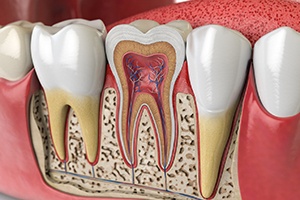


If you have a cracked, decayed, or infected tooth, you may be able to restore it with the help of a root canal treatment. A root canal removes the infected roots and pulp and prevents this damage from spreading to other, healthy teeth, all the while preserving the damaged tooth, so it does not require extraction. Most teeth that undergo this procedure can be used just like your untreated teeth, and because it is still your biological tooth, it still looks and feels natural.

It is difficult to know if you need a root canal treatment without being seen by Dr. Petty. Symptoms that could indicate you may need one include:
Root canal treatments can address tooth infections, tooth decay, and even a cracked tooth. If you are experiencing any of the above symptoms, schedule an emergency appointment at Petty Dental as soon as possible, and Dr. Petty will determine the best course of treatment.

Root canals are a safe and effective solution for several dental problems, including a broken tooth or an untreated cavity that turns into an infection. If you are prescribed this treatment, Dr. Petty will first administer local anesthesia to the area to ensure that it is completely numb. Next, he will use a set of special small instruments to help remove the infected tooth pulp. The pulp will then be replaced with a synthetic material called gutta percha, which rebuilds its structure and shape. You will then get a temporary crown until your permanent crown arrives. Finally, when your permanent crown is ready, you will return to Petty Dental to have it placed. This will protect your tooth from further damage and allow you to use it as you normally would.

Root canals have gotten a bad rap in Hollywood as being painful or scary, but in reality, nothing could be further from the truth. In fact, not only will your mouth be numb during the procedure, but most patients also feel better after treatment, not worse!
Preserving your natural tooth has both financial and health benefits over extraction, including the continued stimulation of the jawbone and the safeguarding of your nearby healthy teeth.
Because they look just like your natural teeth, the dental crowns used in root canal treatment won’t draw attention to dental damage. In fact, many patients go on to enjoy use of their treated tooth for the rest of their lives.
Keeping your treated tooth in great condition is easy. Just brush your teeth twice a day and floss once a day as you normally would. Most crowns last up to ten years with proper care, but will eventually need to be replaced, however with excellent oral hygiene, the underlying natural tooth will stay healthy for a lifetime.